Related Research Articles

The National Awakening Party, frequently abbreviated to PKB, is an Islam-based political party in Indonesia.
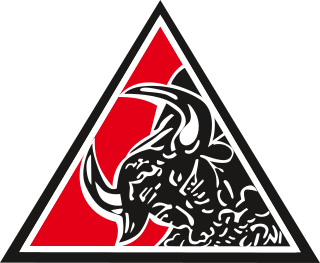
The Indonesian National Party was the name used by several nationalist political parties in Indonesia from 1927 until 1973. The first PNI was established by future President Sukarno. After independence, the new PNI supplied a number of prime ministers, and participated in the majority of cabinets in the 1950s and 1960s. The party was fused into the Indonesian Democratic Party in 1973. In the years following the reforms of the late 1990s, a number of parties claiming to be the continuation of previous PNIs stood in elections, but gained only a handful of seats.

The People's Consultative Assembly of the Republic of Indonesia is the legislative branch in Indonesia's political system. It is composed of the members of the House of Representatives (DPR) and the Regional Representative Council (DPD). Before 2004, and the amendments to the 1945 Constitution, the MPR was the highest governing body in Indonesia.

The Cabinet of the Republic of Indonesia is part of the executive branch of the Indonesian government. It is composed of the most senior appointed officers of the executive branch of the government serving under the president. Members of the Cabinet serves at the president's pleasure, who can dismiss them at will for no cause.
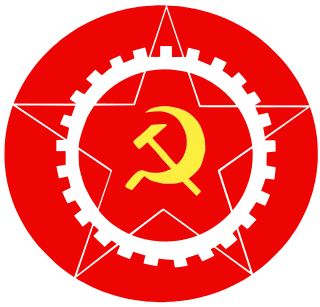
The Labour Party of Indonesia was a political party in Indonesia.

The Acoma Party was a communist party in Indonesia. It evolved out of the Young Communist Force. Acoma was converted into Partai Acoma on 8 August 1952. Acoma/Partai Acoma was led by Ibnu Parna.
Ibnu Parna was an Indonesian communist politician and leader of the Acoma Party, and trade unionist.

The Labour Party was a political party in Indonesia. It was formed on 25 December 1949 by a group of former Labour Party of Indonesia (PBI) members, who had disagreed with the merger of PBI into the Communist Party of Indonesia.
Party of the People of Free Indonesia was a political party in Indonesia. The party was based amongst the Sundanese population in West Java. In the 1955 parliamentary election, PRIM got 72,523 votes. One parliamentarian was elected from the party. After the election the party joined the Fraction of Upholders of the Proclamation, a heterogenous parliamentary group with ten MPs.
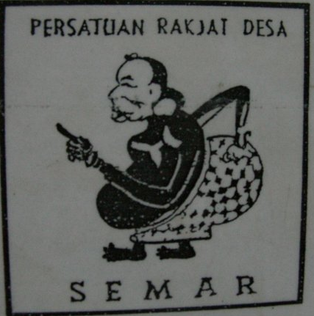
The Village People's Union was a political party in Indonesia. The party was based amongst the Sundanese population in West Java. In the 1955 parliamentary election, PRD got 77,919 votes. One parliamentarian was elected from the party. After the election the party joined the Fraction of Upholders of the Proclamation, a heterogenous parliamentary group with ten MPs.
The Islamic Victory Force was an Islamic political party in Indonesia. The party was based in Madura. In the 1955 parliamentary election, AKUI got 81,454 votes. One parliamentarian was elected from the party.

The Islamic Tharikah Unity Party was an Islamic political party in Indonesia. In the 1955 parliamentary election, PPTI got 85,131 votes. One parliamentarian was elected from the party.
The National Progressive Fraction was a parliamentary group in the Indonesian People's Representative Council, formed after the 1955 parliamentary election. The group consisted of ten Members of Parliament, all elected from Java.
The Development Fraction was a parliamentary group in the Indonesian People's Representative Council. It was formed after the 1955 parliamentary election, by seven independents elected on Communist Party of Indonesia tickets.

The National People's Party, initially founded as the Indonesian National Party–Independent, was a political party in Indonesia. It was founded on 23 July 1950 after a split within the Indonesian National Party (PNI). The divisions with the PNI had appeared at the party congress in May the same year, when Sidik Djojosukarto's followers had emerged victorious. Djody Gondokusumo was the chairman of the party.
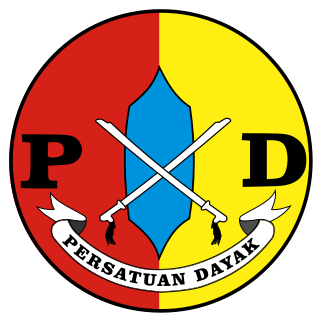
The Dayak Unity Party was a political party in Indonesia. Formed to represent 'primordial' interests of the Dayak people, the party was one few political parties in Indonesia at the time which was formed along ethnic lines. Oevaang Oeray, the first governor of West Kalimantan and one of the founders of the PPD, was a prominent leader of the party.
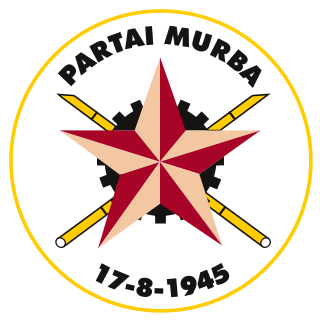
Murba Party was a 'national communist' political party in Indonesia. The party was founded by Tan Malaka, Chairul Saleh, Sukarni and Adam Malik in 1948. The history of the party was largely intertwined with that of the powerful Communist Party of Indonesia (PKI). Initially relations between PKI and the Murba Party were fluid, but gradually the two parties developed into each other's arch-enemies. The Murba Party continued to exist under the New Order, but was merged into the Indonesian Democratic Party in 1973.

The All-Indonesian Federation of Workers'Organisations was the largest trade union federation in Indonesia. Founded during the period of the country's independence in the late 1940s, the federation grew rapidly in the 1950s. Initially formed with loose connections to the Communist Party of Indonesia (PKI) and with members from other parties, over time the PKI became dominant in the organisation. With the introduction of President Sukaro's guided democracy in the late 1950s, SOBSI was formally recognised and given a place in the national decision-making structures. In the 1960s, SOBSI came into conflict with the Army, whose officers controlled the country's state enterprises. Following the 1965 coup that subsequently produced Suharto's New Order regime, SOBSI was declared illegal, its members killed and imprisoned and most of the leadership executed.

The League of Supporters of Indonesian Independence was a right-wing nationalist political party in Indonesia established by former Army head General Abdul Haris Nasution as a vehicle for the Indonesian Army to enter the realm of politics. It was influential in persuading President Sukarno to introduce Guided Democracy in Indonesia and return to the 1945 Constitution.

Suwiryo was an Indonesian politician. He served as the first Mayor of Jakarta following the proclamation of Indonesian independence from 1945 until 1947 and again from 1950 until 1951. Additionally, he served as Deputy Prime Minister of Indonesia under Prime Minister Soekiman Wirjosandjojo from 1951 until 1952. A member of the Indonesian National Party, he was also the party's sixth chairman, serving from 1956 until his ousting by Ali Sastroamidjojo in 1960.
References
- 1 2 Feith, Herbert. The Decline of Constitutional Democracy in Indonesia . An Equinox classic Indonesia book. Jakarta [u.a.]: Equinox, 2007. p. 472